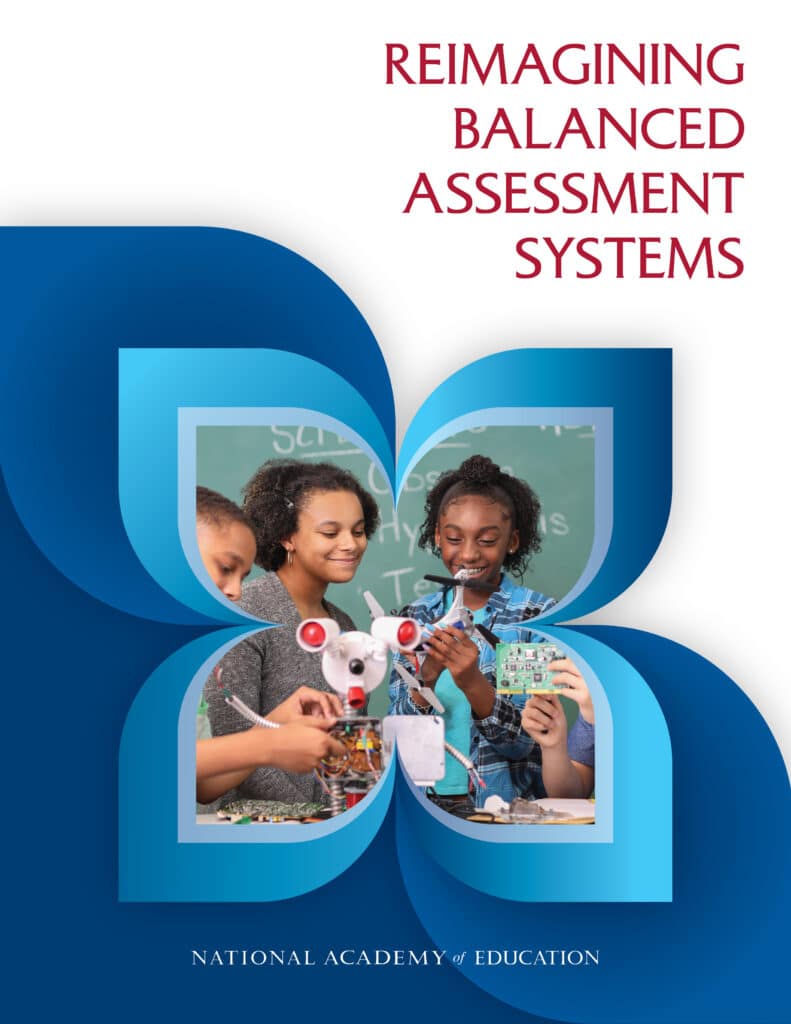Expansion of Groundbreaking Work Provides Guidance for Implementing Powerful Assessment Systems to Advance Student Learning

The National Academy of Education (NAEd) today released Reimagining Balanced Assessment Systems which expands upon our understanding of balanced assessment systems and provides critical guidance to researchers and practitioners. With this groundbreaking new volume, we provide a guide for state and district leaders and policymakers as they implement systems that provide the insight we need to support student learning.
“Good assessments are crucial to understanding and supporting student learning, but far too often, our approach is incoherent and ineffective,” said James Pellegrino, a co-editor of the volume. “It was time to build on what we already know, and capitalize on updated views of learning, equity, and classroom assessment, to offer a richer vision of balanced assessment systems.”
Pellegino was also co-editor of the highly influential Knowing What Students Know: The Science and Design of Educational Assessment, the 2001 National Research Council report that shaped the concept and practice of balanced assessment systems.
Because of their potential to support student learning, people have been talking about balanced assessment systems for over 20 years. So why don’t we see more of them in practice? The new volume attempts to answer that question and provide a roadmap for developing, implementing and using balanced assessment systems.
Reimagining Balanced Assessment Systems explores the history of these assessment systems and reimagines their use by centering equitable and ambitious teaching and learning.
In doing so, the volume provides guidance to state and local educational agencies, as well as schools and teachers, regarding how to (1) foster and maintain a culture of productive assessment use to improve ambitious and equitable teaching and learning at the classroom level; (2) design policy, professional learning, and other local systems necessary to implement balanced assessment systems; and (3) implement processes to use aggregate data to continually improve the assessment system itself to better serve all students, especially those most disenfranchised.
By centering the classroom in the development of an assessment system, the components and practices of such systems are more likely to truly support teaching and learning. Therefore, for assessment systems to be “balanced,” they must support teaching and learning that occurs in the classroom, directly or indirectly.
“Reimagined” Definition of Balanced Assessment Systems
Balanced assessment systems and practices are intentionally designed to provide feedback to students and information for teachers to support ambitious and equitable instructional and learning opportunities. This type of assessment system facilitates educator engagement in high-leverage professional practices such as quality formative assessment to support ambitious and equitable teaching. Assessments outside of the classroom, at the district and state level, provide aggregate data to policymakers and education leaders, allowing for the monitoring of educational opportunities and support for high-quality instruction indirectly through the provision of appropriate curricular resources and professional development opportunities (Chapter 1).
The volume documents prior struggles in implementing balanced assessment systems (Chapter 2); expounds upon and grounds balanced assessment systems in the most up-to-date knowledge of human learning and development (Chapter 3); and situates the work of balanced assessment systems within classrooms supporting ambitious and equitable teaching and learning with robust assessment literacy and professional learning for educators (Chapter 4 and Chapter 5). At the same time, it recognizes the critical roles of schools, districts, and states in establishing and supporting balanced assessment systems (Chapter 6 and Chapter 7). It also provides considerations for developing, implementing, and institutionalizing the complex educational innovation of balanced assessment systems, as well as critical lessons for enacting policies to promote balanced assessment systems (Chapter 8 and Chapter 9).
The project and research was supported by funding from Smarter Balanced/University of California Santa Cruz. The opinions expressed are those of the NAEd and authors and do not represent views of Smarter Balanced/University of California Santa Cruz.
Presentations at NCME and AERA
If you plan to be in Philadelphia for the annual AERA and NCME meetings, consider joining us for the following sessions:
Friday, April 12, 1:15 to 2:45 ET
NCME: Toward Balanced and Equitable Assessment Systems: Considerations for Implementation and Use with Lorrie Shepard, Guillermo Solano-Flores, Amy Berman, Scott Marion, and James Pellegrino
Sunday, April 14, 9:35 to 11:05 ET
AERA: Classroom Assessment and Assessment Literacy Practices to Support Equitable and Ambitious Teaching and Learning with James Pellegrino, Maria Araceli Ruiz-Primo, Erin Marie Furtak, Caroline Wylie, Margaret Heritage, Elena Diaz-Billelo, Jared Anthony, Lorrie Shepard, and Courtney Bell
Sunday, April 14, 11:25 to 12:55 ET
AERA: Toward Balanced Assessment Systems: Considerations for Implementation and Use with Scott Marion, Amy Berman, Donald Peurach, Laura Hamilton, José Felipe Martínez, Carla Evans, Erika Landl, Ajit Gopalakrishnan, and Debbie Durrence
